| All Hallows' School | |
|---|---|
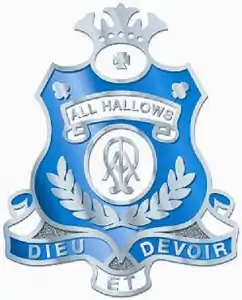 | |
| Address | |
547 Ann Street , Queensland , 4000 Australia | |
| Coordinates | 27°27′38″S 153°2′1″E / 27.46056°S 153.03361°E |
| Information | |
| Type | Private, single-sex, day school |
| Motto | French: Dieu et Devoir (God and Duty) |
| Denomination | Roman Catholic, Sisters of Mercy |
| Established | 1861 |
| Principal | Catherine O'Kane |
| Teaching staff | 128 (107 FTE)[1] |
| Employees | 113[1] |
| Enrolment | 1,562[1] (August 2019) |
| Colour(s) | Light blue, white, rust |
| Affiliation | Catholic Secondary Schoolgirls' Sports Association |
| Website | www |
All Hallows' School (AHS) is a Catholic day school for girls, located in Fortitude Valley, close to the central business district of Brisbane, Queensland, Australia.
Founded in 1861, the school is a day school, having had a boarding school attached to it for many years. It follows in the tradition of the Irish Sisters of Mercy, and caters for more than 1,550 girls from Years five to twelve.[1] The school was the first permanent home of the Sisters of Mercy in Queensland,[2] and is the oldest surviving secondary school in Brisbane.[1]
All Hallows' is a member of the Association of Heads of Independent Schools of Australia (AHISA),[3] the Alliance of Girls' Schools Australia,[4] the Australasian Mercy Secondary Schools Association,[5] and the Catholic Secondary Schoolgirls' Sports Association.[6]
The school's motto is in French, Dieu et Devoir (English: "God and Duty"). This motto was formulated in 1911, 50 years after the school opened. The French language was chosen for the motto on the basis of the strong French influence in the school's early years.[7]
Many of the All Hallows' School Buildings have been listed on the Queensland Heritage Register.[2]
In the 2017 NAPLAN Year 9 test, All Hallows' was ranked in the top 10 Queensland secondary schools.[8]
History
19th century
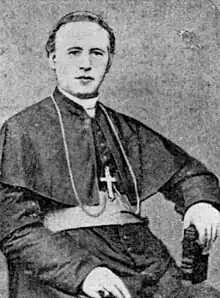
The story of the foundation of All Hallows' School must be set against the rudimentary "pioneer" education system and bitter sectarian disputes in Queensland education during the 1850s and early 1860s. According to Johnston,[9] until 1860 "secondary education tended to receive a fairly low priority in state thinking – which was not surprising since the provision of a primary level was so difficult, too difficult to manage". He continues: "There were no state initiatives to provide its own system until 1912. Secondary education, seen as a perquisite of middle-class life, suitable for the children of business and professional men and established pastoralists, was allowed to be offered by private and church bodies."[9]
Queensland historian Ross Fitzgerald points out that until well into the twentieth century "the majority of (Queensland Catholics) ... belonged to lower socio-economic groups".[10]
First Catholic secondary school in Queensland
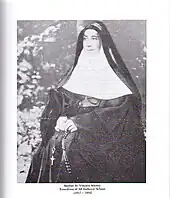
Contrary to the development of most schools, All Hallows' School, as the first Catholic secondary school in Queensland,[11] sought to serve those less fortunate in colonial society while operating under the same legislative framework as the more affluent grammar schools. Serving poorer, often Irish, Roman Catholic, immigrant women in the area of Fortitude Valley, the school did not raise the required subscription for government aid and, in a time of bitter sectarianism within Queensland, the school maintained fierce independence in curriculum from what was seen by many within the Catholic community as attempts by a hostile secular government at interference.
Relocation to Duncan's Hill

In 1863, with pupils and sisters growing in numbers, it was soon realised that a suitable place for a convent must be found. It was envisaged that a small House of Mercy would be established on the site of what would become All Hallows' School. 1 November 1863 saw the transfer of the party from a small structure adjacent to what is now Saint Stephen's Cathedral to 'Adderton House' overlooking the Brisbane River from high upon Duncan's Hill.
The Bishop has lately purchased the finest house and situation in Brisbane for a convent. The purchase money is 6,000 – where it is to come from I know not – but I trust God will send it. As soon as we get into it, we are to commence a House of Mercy ... The constant influx of Emigrants renders a House of Mercy desirable but it will not be a big one.[12]
Mother Vincent Whitty marvelled at the position of the new house in a way that many visitors to the school have done since 1863. Writing to Ireland with news of the move to Duncan's Hill she stated:
I wish I could give you an idea of the beauty of the situation of this house. The view of the river from the Balcony is lovely and in the distance the thick bush, is here and there cleared away, with the town at one side of the River, it certainly is very beautiful.[13]
Adderton House
Adderton House was constructed in 1858 by John Petrie for George Fullerton.[14]
St Ann's Industrial School
.jpg.webp)
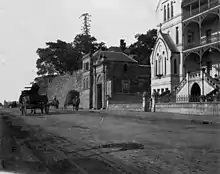
St Ann's Industrial School was opened on 15 July 1894 by the Governor of Queensland Henry Wylie Norman. Its purpose was to provide a home and education to neglected or delinquent girls. It was designed by architect F. D. G. Stanley. In the 1940s it was partially converted to a boarding house for young women working in the Brisbane central business district or studying at the University of Queensland. In 1964 it was remodelled as classrooms for the All Hallows' School.[2]
House system
All Hallows' has a mixed age house structure. Every student and staff member belongs to one of the eight houses which are named after people or places within the history of the school. Each house is given a color.[15]
- Adderton – green, named after Adderton House, the first building on the school grounds.
- Coolock – blue, named after the house in Ireland where Catherine McAuley lived.
- Gorry – gold, named after Queensland born Mercy Sister Jane Gorry.
- Loretto – pink, named after long serving school principal Sister M. Loretto Flynn. Principal: 1916, 1933–1959.
- McAuley – silver, named after the founder of the Mercy Sisters, Catherine McAuley.
- Mercedes – orange, pronounced /mɛərˈseɪdɛs/ mair-SAY-dess as per the Spanish word for 'Mercy'.
- Tighe – purple, named after the first enrolled student at AHS, Annie Tighe.
- Whitty – red, named after the first principal of AHS, Mother Vincent Whitty.
Notable alumnae
Former students of All Hallows' are known as "Old Girls"; they may elect to join the Past Pupils' Association.[16]
- Thea Astley, author and novelist[17]
- Fran Bailey, member of the House of Representatives, Parliament of Australia.[18]
- Verity Barton, LNP member of the Legislative Assembly of Queensland for Broadwater[19]
- Isabella Bliss, winner of Junior MasterChef Australia in 2010[20]
- Caitlin Cronin, Australian rowing team (Olympics)[21]
- Ellen Fanning, journalist[22]
- Diane Fingleton, first female Chief Magistrate of Queensland[23]
- Teresa Gambaro, LNP member of House of Representatives, Parliament of Australia[24]
- Macy Gardner, netballer[25]
- Tahli Gill, Australian curling team (Olympics)[26]
- Grace Grace, ALP Queensland Minister for Education[27]
- Dr Beth Hamilton, Director of Ubuntu Through Health and Queensland Rhodes Scholar 2018[28][29]
- Ernestine Hill (1899–1972), journalist, travel writer, novelist[30]
- Marguerite Houston, Australian rowing team (Olympics)[31]
- Miranda Kerr, model[32]
- Mary Emelia Mayne (1858–1940), philanthropist[33]
- Maxine McKew, ALP member of the House of Representatives seat of Bennelong[34]
- Kateena O'Gorman, barrister and Queensland Rhodes Scholar 2003[29][35][36]
- Sarina Russo, entrepreneur[37]
- Grace Sewell, singer and songwriter[38]
- Tracey Wickham, Australian swimmer (Olympics and Commonwealth Games)[39][40]
Historic images
 Sister Jane Gorry, first Queensland-born Mercy sister
Sister Jane Gorry, first Queensland-born Mercy sister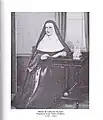 Mother Catherine McAuley – founder of Mercy Order
Mother Catherine McAuley – founder of Mercy Order Class with their Mercy Sister teachers in 1890
Class with their Mercy Sister teachers in 1890 Main Street, Kangaroo Point, looking north across the Brisbane River to All Hallows' School, Duncan's Hill. The architect for the main building was Andrea Stombuco.
Main Street, Kangaroo Point, looking north across the Brisbane River to All Hallows' School, Duncan's Hill. The architect for the main building was Andrea Stombuco. 1915 photograph of the staff of Austral Carriage Works shows the facade of what is now beneath the Claver Theatre and Consilo Aquatic Complex. This facade is heritage listed and provides part of the All Hallows' School Boundary Street fence line.
1915 photograph of the staff of Austral Carriage Works shows the facade of what is now beneath the Claver Theatre and Consilo Aquatic Complex. This facade is heritage listed and provides part of the All Hallows' School Boundary Street fence line.
See also
References
- 1 2 3 4 5 "Annual Report 2019" (PDF). All Hallows' School. 2019. Retrieved 11 March 2021.
- 1 2 3 "All Hallows Convent and School (entry 600200)". Queensland Heritage Register. Queensland Heritage Council. Retrieved 1 August 2014.
- ↑ "AHISA Schools: Queensland". Association of Heads of Independent Schools of Australia. April 2007. Archived from the original on 29 August 2007. Retrieved 8 September 2007.
- ↑ "Member Schools". Alliance of Girls' Schools Australia. Archived from the original on 28 September 2007. Retrieved 8 September 2007.
- ↑ "All Hallows' School, Brisbane". Australasian Mercy Secondary Schools Association. Archived from the original on 29 August 2007. Retrieved 8 September 2007.
- ↑ "Catholic Secondary Schoolgirls' Sports Association History". Fox Sports. 2014. Archived from the original on 2 April 2015. Retrieved 22 March 2015.
- ↑ "Symbols at All Hallows". All Hallows. Archived from the original on 9 April 2013. Retrieved 14 January 2013.
- ↑ Stigwood, Emmaline (3 August 2017). "NAPLAN results 2017 Qld: Private colleges dominate high schools". The Courier-Mail. Retrieved 18 December 2017.
- 1 2 Johnston 1982, p. 104
- ↑ Fitzgerald 1984, p. 12.
- ↑ "The All Hallows' Story". Allhallows.qld.edu.au. Archived from the original on 7 April 2011. Retrieved 14 January 2012.
- ↑ Whitty 2001, pp. 61–62 (on 18 August 1863
- ↑ Whitty 2001, pp. 71–72 (on 19 October 1863
- ↑ Mahoney 1985, p. 6.
- ↑ "AHS House System". Archived from the original on 12 September 2012. Retrieved 6 December 2012.
- ↑ "Past Pupil's Association". All Hallows' School. Archived from the original on 29 August 2007. Retrieved 8 September 2007.
- ↑ Sheridan, Susan. (2011). Nine Lives: Postwar Women Writers Making Their Mark. University of Queensland Press. ISBN 9780702247415.
- ↑ Perkin, Corrie. (28 February 2009). "Member at the seat of the fire". The Australian. Retrieved 16 January 2013.
- ↑ "Member Biography". Legislative Assembly of Queensland. Archived from the original on 4 April 2013. Retrieved 15 January 2013.
- ↑ "Twins rasied(sic) on a menu of faith" Archived 9 March 2011 at the Wayback Machine by Selina Venier, The Catholic Leader, 12 December 2010
- ↑ Dawson, Andrew (1 September 2021). "Schoolgirls Head of the River 2021: Tokyo Olympic Games medallist Caitlin Cronin returns to All Hallows' School".
- ↑ "Chris Beck talks to Ellen Fanning", The Age, Green Guide, 9 November 2006.
- ↑ Mahlouzarides, Molly; Miller, Danielle (22 December 2011). "Diane Fingleton". University of Queensland. Archived from the original on 27 March 2013. Retrieved 14 January 2013.
- ↑ "Teresa Gambaro". Liberal Party of Australia. Archived from the original on 18 January 2013. Retrieved 14 January 2013.
- ↑ "Sport". All Hallows' School. 12 October 2020. Retrieved 11 October 2020.
- ↑ O'Kane, Catherine (February 2022). "Message from the Principal". All Hallows' School Newsletter.
- ↑ Lynch, Lydia (17 October 2020). "The 'cheeky' schoolgirl charged with running education".
- ↑ Griffith University (November 2017). "Griffith medicine grad named Queensland's 2018 Rhodes Scholar". Griffith News. Retrieved 26 July 2020.
- 1 2 O'Kane, Catherine (August 2018). "Message from the Principal". All Hallows' School Newsletter.
- ↑ Bonnin, Margriet R.; Bonnin, Nancy (1996). "Hill, Mary Ernestine (1899–1972)". Australian Dictionary of Biography. Vol. 14. National Centre of Biography, Australian National University. ISSN 1833-7538.
- ↑ "Houston has the rowing world at her feet". (5 November 2002). The Courier-Mail, Brisbane, Australia. p35.
- ↑ Melissa Field (8 October 2009). Miranda's Kerr-Ching! factor Archived 9 November 2012 at the Wayback Machine. The Daily Telegraph. Accessed 4 April 2012.
- ↑ Crouchley, Betty (1986). "Mayne, Mary Emelia (1858–1940)". Australian Dictionary of Biography. National Centre of Biography, Australian National University. ISSN 1833-7538. Retrieved 30 August 2011.
- ↑ Fraser, Andrew (27 February 2007). "Hard start unites McKew and Rudd". The Australian. Archived from the original on 28 February 2007. Retrieved 1 March 2007.
- ↑ The Catholic Leader (March 2011). "Women honoured on international day". The Catholic Leader. Retrieved 26 July 2020.
- ↑ The University of Queensland (15 October 2002). "UQ Student Wins Rhodes Scholarship". UQ News. Retrieved 26 July 2020.
- ↑ de Silva, Margaret. (2011). "Person of the Year 2011 – Candidate #6: Sarina Russo", bmag. Retrieved 16 January 2013. Archived 28 March 2012 at the Wayback Machine
- ↑ Moran, Jonathan (19 September 2013). "Unknown brother-and-sister Aussie musos Conrad and Grace Sewell on a path to fame and fortune". The Daily Telegraph. Archived from the original on 22 June 2016. Retrieved 7 September 2015.
- ↑ Robson, Frank. (7 August 1999). "Cyclone Tracey". The Sydney Morning Herald, Australia. p27.
- ↑ "Swimming Archived 9 April 2013 at the Wayback Machine", All Hallows School. Retrieved 16 January 2013.
Sources
- Fitzgerald, Ross (1984). A History of Queensland: 1915 to the Early 1980s. Brisbane: University of Queensland Press. ISBN 0702219576.
- Johnston, W. Ross (1982). The Call of the Land: A History of Queensland to the Present Day. Brisbane: Jacaranda. ISBN 9780701616557.
- Mahoney, Jean-Marie (1985). Dieu et Devoir: The Story of All Hallows' School Brisbane, 1861–1981. Brisbane: Boolarong. ISBN 9780958961608.
- Whitty, Mary Vincent (2001). Mercy Women Making History: From the Pen of Mother Vincent Whitty. Ashrove, Brisbane: Corporation of the Trustees of the Order of the Sisters of Mercy in Queensland. ISBN 0958003807.